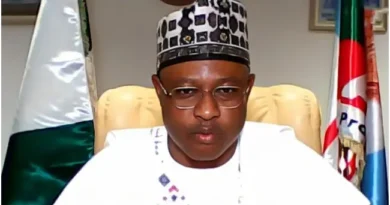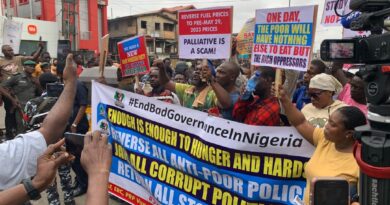NNPC reports N9.3tn petrol imports as queues linger
The Nigerian National Petroleum Company Limited has confirmed that the Federal Government incurred a debt of N5.1tn in under-recovery and energy security expenses for fuel importation in 2023.
It also stated that a total sum of N9.38tn, described as receivables, was incurred on behalf of the Federal Government in 2023 for fuel imports.
In its financial statement for the fiscal year ending December 31, 2023, the national oil firm explained that N6.25tn was accrued under domestic crude oil supply and N3.14tn under other receivables.
Receivables, also regarded as accounts receivable, are debts owed to a firm by its customers for goods or services used or delivered but not yet paid for.
The amount (N9.38tn) was N7.2tn or 76.7 per cent more than the N2.18tn expenses incurred in the preceding year of 2022.
“Receivables from the Federation relate to expenses incurred on behalf of the Federation by the Group,” the report noted.
On the N5.1tn in under-recovery and energy security expenses, the firm stated that the cumulative amount spent was used as expenses from crude oil supply for domestic use and other receivables on behalf of the federation after it instructed the company not to sell its Premium Motor Spirit, popularly known as petrol, above a certain regulated price.
This total cost is made up of January to May 2023 under-recovery of N3.3tn and August-December 2023 energy security expense of N1.8tn.
The new term (under-recovery), as indicated in the financial statement of the NNPC for the fiscal year ending December 31, 2023, is a technical term to conceal a secret, a petroleum engineer and oil and gas analyst, Bala Zakka, stated on Tuesday.
“In my capacity as a practising petroleum engineer and a tax analyst, everything about the NNPC presentation looks vague,” Zakka told News HQ.“
This is because when you are talking to Nigerians, you need to be simple in language so that people can understand. It is only when you are talking to experts you use technical jargon. That term was used to confuse, convince and conceal a secret we all know and the company has not done any good service on this.”
Also, former Executive Secretary of the Nigeria Extractive Industries Transparency Initiative, Waiziri Adio, asked the NNPCL to be transparent in its dealings and stop using vocabulary to deceive Nigerians.
He said this while reacting to the national oil company’s response to reports that President Bola Tinubu had approved subsidy payment.The Chief Financial Officer of the NNPCL, Umar Ajiya, had said the oil firm was only bearing what he called the “shortfall” and not a subsidy.
But reacting in a series of tweets on Tuesday, Waiziri Adio, who is the Executive Director of Agora Policy, a Nigerian think tank and non-profit organisation committed to finding practical solutions to urgent national challenges, wondered why the company was playing with words.
Adio stated, “NNPCL’s waffling on petrol subsidy is so disingenuous. Oh, it is not a subsidy, but a shortfall/PMS FX differential, same difference. No subsidy was paid to any marketer. Has anyone said NNPCL paid subsidy to marketers and is it even within their remit to pay subsidy to marketers?
“Former PPPRA was charged with approving subsidies for marketers and NNPC. The Ministry of Finance was paying marketers after verification of claims. The only difference with NNPC was that it deducted its subsidy and other claims from money for crude given to it for domestic use.“
It is not NNPCL’s responsibility, by practice or by law, to pay subsidies to marketers. That answer to a question not asked is at best a hollow attempt at deflection.”
He added, “Saying there is no subsidy because selling PMS below landing cost is a transaction between the company and the Federation (repaid or netted off) is a lame play with words that takes everyone for a moron. NNPCL can use this free advice: when in a hole, stop digging.”
Although President Bola Tinubu announced the removal of fuel subsidies during his inaugural address on May 29, 2023, there have been strong indications that the government still spends billions on subsidies. However, the federal government has consistently denied paying subsidies.
Former President Olusegun Obasanjo, in an interview with Financial Times during the nationwide hunger protest earlier this month, faulted the fuel subsidy removal by President Bola Tinubu.
According to him, the government should have put measures in place before the fuel subsidy removal.
“There’s a lot of work that needs to be done. Not just wake up one morning and say you removed the subsidy.“
Because of inflation, the subsidy that we have removed is not gone. It has come back,” Obasanjo said.
Last month, the Major Energies Marketers Association of Nigeria disclosed that the landing cost of petrol was N1,117/litre leading to a monthly subsidy of N707bn.
Currently, a litre of fuel is sold between N650, N700 and N950, depending on location in the country, which has aggravated the economic hardship faced by Nigerians.
Earlier this month, when some Nigerians hit the streets to protest hunger and hardship in the country, one of their demands was the reinstatement of subsidies.
But in his national broadcast, Tinubu ruled out the return of the subsidy, describing the decision to remove the fuel subsidy as painful but necessary.
Similarly, the NNPC Ltd has stated that it is selling petrol at only half the land cost but bearing the “shortfall” and not as a subsidy.
Its chief financial officer, Ajiya, told journalists that the national oil company was only “taking care of the shortfall on petrol importation between it and the federation.”
This is despite the company demanding a refund of N4.7tn as exchange rate differentials from fuel import.
A breakdown as indicated on the NNPCL books showed that the debt claims had an opening balance of N2.1tn from the closing period of 2022, an undefrayed cost of N4.84tn and a payment of N649.45bn as defrayed costs making a total of N6.25tn.
Explaining the implications, the oil company said, “The total undefrayed cost is made up of January to May 2023 under-recovery of N3.3tn and August-December 2023 energy security expense of N1.8tn.”
It added, “Under-recovery arises when the landing cost of Premium Motor Spirit is higher than the local regulated market price. These amounts are receivable to the Group as they are defrayed and charged against amounts due to the Federation every month.“
Energy security expenses are expenses incurred by the group in fulfilling its obligations as the supplier of last resort for energy security purposes on the account of the federation in line with the provisions of Section 164(m) of the Petroleum Industry Act, 2021.
“As of year-end 31 December 2022, the amount to be remitted based on crude oil purchased is due 90 days after the period of lifting. During the period, the Company made a total cash payment of nil (2022: N58.8bn) to the Federation leaving an outstanding payable of N6.25tn from an amount of N2.06tn in 2022.
“In line with Section 64(M) of the Petroleum Industry Act (PIA) 2021, the cost incurred by NNPC Limited (Group) as the energy supplier of last resort for energy security reasons, and all associated costs shall be on the account of the Federation.“
The government instructed that NNPCL cannot sell its Premium Motor Spirit above a certain regulated price. However, the cost of importing this PMS is usually much higher than this regulated price. The under-recovery is essentially the difference between the actual landing cost of the product and the regulated price. This balance is used to reduce the cost of sales of the Group.
“The corresponding entry is either used to reduce the liability due to the Federation or used as a receivable from the Federation. Premium Motor Spirit cost under-recovery is recognised where there is reasonable assurance that it will be received and all attached conditions have been complied with. When it relates to an expense item, they are deducted in reporting the related expense in cost of sales.”
The audited statement also stated that the company received a total sum of N23.99tn as revenue from contracts with customers but spent a total of N16.95tn as cost of sales leaving a gross profit of N7.03tn.
According to experts, this cost of sales, which indicates the cost involved in directly producing the goods or services that you sell, is exorbitant and detrimental to the financial stability of the company.
The figure is an increase of N15.17tn or 63.2 per cent from N8.82tn recorded as revenue from contracts in 2022 and a surge of 60.5 per cent or N10.25tn from N6.7tn from the cost of sales in 2022.




